Related Research Articles

Ray Edward Cochran was an American rock and roll musician. Cochran's songs, such as "Twenty Flight Rock", "Summertime Blues", "C'mon Everybody" and "Somethin' Else", captured teenage frustration and desire in the mid-1950s and early 1960s. He experimented with multitrack recording, distortion techniques, and overdubbing even on his earliest singles. He played the guitar, piano, bass, and drums. His image as a sharply dressed and attractive young man with a rebellious attitude epitomized the stance of the 1950s rocker, and in death he achieved iconic status.

Earl Cyril Palmer was an American drummer. Considered one of the inventors of rock and roll, he is a member of the Rock and Roll Hall of Fame.
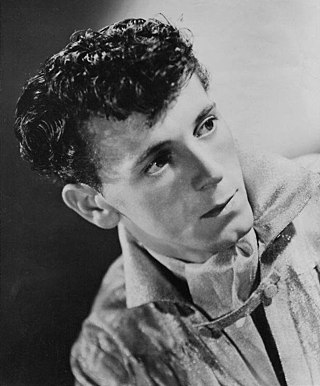
Vincent Eugene Craddock, known as Gene Vincent, was an American musician who pioneered the styles of rockabilly and rock and roll. His 1956 top ten hit with his backing band the Blue Caps, "Be-Bop-a-Lula", is considered a significant early example of rockabilly. His chart career was brief, especially in his home country of the US, where he notched three top 40 hits in 1956 and '57, and never charted in the top 100 again. In the UK, he was a somewhat bigger star, racking up eight top 40 hits from 1956 to 1961.

Liberty Records was a record label founded in the United States by chairman Simon Waronker in 1955 with Al Bennett as president and Theodore Keep as chief engineer. It was reactivated in 2001 in the United Kingdom and had two previous revivals.

Sharon Kathleen Sheeley was an American songwriter who wrote songs for Glen Campbell, Ricky Nelson, Brenda Lee, and Eddie Cochran.

"Summertime Blues" is a song co-written and recorded by American rock artist Eddie Cochran. It was written by Cochran and his manager Jerry Capehart. Originally a single B-side, it was released in August 1958 and peaked at number 8 on the Billboard Hot 100 on September 29, 1958, and number 18 on the UK Singles Chart. It has been covered by many artists, including being a number-one hit for country music artist Alan Jackson, and scoring notable hits in versions by Blue Cheer, the Who and Brian Setzer, the last of whom recorded his version for the 1987 film La Bamba, in which he portrayed Cochran. Jimi Hendrix performed it in concert. T. Rex recorded their own rendition of the song for their self-titled debut album T. Rex in 1970 and performed it live.
John Dee Loudermilk Jr. was an American singer and songwriter. Although he had his own recording career during the 1950s and 1960s, he was primarily known as a songwriter.
"(I Know) I'm Losing You" is a 1966 hit single recorded by the Temptations for the Gordy (Motown) label, written by Cornelius Grant, Eddie Holland and Norman Whitfield, and produced by Norman Whitfield.

Edwin Ellsworth Peabody was an American banjo player, instrument developer and musical entertainer whose career spanned five decades. He was the most famous plectrum banjoist of his era.
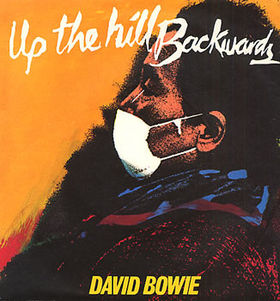
"Up the Hill Backwards" is a song by English musician David Bowie, released on his 1980 album Scary Monsters . It was later issued by RCA Records as the fourth and final single from the album in March 1981. Originally written under the title "Cameras in Brooklyn", the song was recorded between February and April 1980 at the Power Station in New York City and Good Earth Studios in London. The recording features backing vocalists, guitar contributions from Robert Fripp and acoustic guitar played by co-producer Tony Visconti. Lyrically, the song concerns the struggles of facing a crisis, partially influenced by Bowie's divorce from his wife Angie. Musically, the song contains numerous time signature changes and a Bo Diddley-inspired beat.
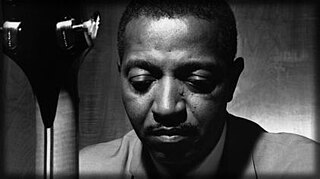
Frederick William Green was an American swing jazz guitarist who played rhythm guitar with the Count Basie Orchestra for almost fifty years.

"I'll See You in My Dreams" is a popular song, composed by Isham Jones, with lyrics by Gus Kahn, and published in 1924. It was recorded on December 4 that year, by Isham Jones conducting Ray Miller's Orchestra. Released on Brunswick Records, it charted for 16 weeks during 1925, spending seven weeks at number 1 in the United States. Other popular versions in 1925 were by Marion Harris; Paul Whiteman; Ford & Glenn; and Lewis James; with three of these four reaching the Top 10.

Earth vs. the Spider is an independently made 1958 American black-and-white science fiction horror film produced and directed by Bert I. Gordon, who also provided the plot upon which the screenplay by George Worthing Yates and Laszlo Gorog was based. Though the title suggests a global crisis, the film focuses entirely on a small town being terrorized by a giant spider whose origin is never explained. The film stars Ed Kemmer, June Kenney and Eugene Persson. The special effects were by Bert I. Gordon and Paul Blaisdell. Earth vs. the Spider was released by American International Pictures as a double feature in different film markets with either The Brain Eaters or The Screaming Skull.

"C'mon Everybody" is a 1958 song by Eddie Cochran and Jerry Capehart, originally released as a B-side.

James Melven Dannaldson starred in the Frank Buck film Jacaré.
Wha-Koo was an American rock band best known for their 1978 single, "(You're Such a) Fabulous Dancer", which peaked at #101 on the Billboard and #10 on the Australian charts.
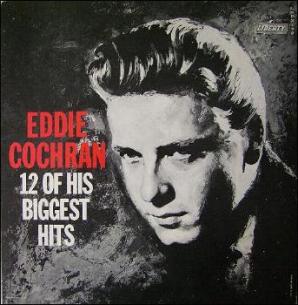
The Eddie Cochran Memorial Album is the second album by Eddie Cochran, released on Liberty Records in mono, LRP 3172, in May 1960. It had previously been issued as 12 of His Biggest Hits in April 1960 with the same catalogue number, but after Cochran's death on April 17 it was retitled and reissued, and has remained so titled ever since. It is currently in print on the Magic Records label in France, on CD on EMI-Toshiba in Japan, and on BGO in the UK as a twofer with "Singin' To My Baby."
The Who Tour 1979 was The Who's first concert tour since the death of original drummer Keith Moon. The tour supported their 1978 album Who Are You, and consisted of concerts in Europe and the United States and acknowledged the band's return to live performance.
Huelyn Wayne Duvall was an American rock and roll and rockabilly musician.
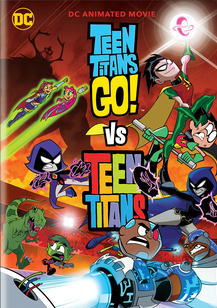
Teen Titans Go! vs. Teen Titans is a direct-to-video animated superhero film, and a crossover between the television series Teen Titans Go! and the original Teen Titans, both of which are adapted from the DC Comics superhero team of the same name. It is also the second Teen Titans Go! movie, after Teen Titans Go! To the Movies. Warner Bros. announced that a crossover featuring the two teams was being made at Comic-Con on July 21, 2019, followed by a digital release on September 24, then followed by a DVD and Blu-ray release on October 15. The events of the film take place during the fifth season of Teen Titans Go! and after the finale of the fifth season of Teen Titans and its TV film sequel Teen Titans: Trouble in Tokyo. The film premiered on television on Cartoon Network on February 17, 2020.
References
- ↑
- Bobby Cochran, Susan Van Hecke (2003). Three Steps to Heaven: The Eddie Cochran Story. Hal Leonard. ISBN 978-0-634-03252-3.
- ↑
- Julie Mundy (2001). Don't Forget Me: The Eddie Cochran Story. Billboard Books. ISBN 0823079317.
- ↑ Independent Press-Telegram from Long Beach, California. Feb. 19, 1956 page 25.